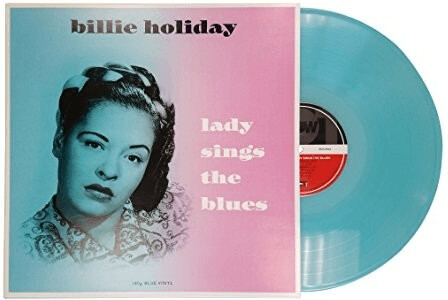

He refuses and she throws her drink in his face. Billie has too much to drink and asks Harry for drugs, saying that she does not want her family to know that the radio show upset her. The group heads to Cafe Manhattan to drown their sorrows. In New York, Reg and Louis arrange Billie's radio debut, but the station does not call her up to the stage to sing the radio sponsors, a soap company, objected to her race.

Billie promises to stay off the drugs if Louis stays with her. In her dressing room, Louis notices her needle marks, knows that she is doing drugs, and tells her she is going home with him. One night when Billie is performing, Louis comes to see Billie. The harsh experiences on the tour result in Billie taking drugs, which Harry supplies after Billie collapses on stage. During the tour, Billie witnesses the aftermath of the lynching of an African-American man, which presses her to record the controversial song " Strange Fruit". Eventually she is discovered by Harry and Reg Hanley, who sign her as a soloist for their southern tour in hopes of landing a radio network gig. Billie takes a liking to Louis and begins a relationship with him. Billie takes the money and sings " Them There Eyes". After "Piano Man" accompanies Billie when she sings " All of Me", club owner Jerry books her as a singer in the show.īillie's debut begins unsuccessfully until Louis McKay arrives and gives her a fifty dollar tip. Eventually, Billie tires of scrubbing floors and becomes a prostitute, but later quits and returns to a nightclub to unsuccessfully audition to become a showgirl. The brothel is run by arrogant and selfish owner Lorraine, who pays Billie very little money.

She runs away to her mother Sadie, who sets up a job cleaning for another brothel in the Harlem section of New York. When she returns to her aunt's house, she is home alone and is raped by a man who followed her home from the brothel. In a flashback to 1928, Billie is working as a housekeeper in a brothel in Baltimore. Billie Holiday, is arrested on a drug charge. In 1936 New York City, Eleanora Fagan, a.k.a. The film was nominated for five Academy Awards in 1973, including Best Actress in a Leading Role for Diana Ross. Diana Ross, in her feature film debut, portrayed Holiday, alongside a cast including Billy Dee Williams, Richard Pryor, James T. It was produced by Motown Productions for Paramount Pictures. Furie about jazz singer Billie Holiday, loosely based on her 1956 autobiography which, in turn, took its title from Holiday's song. Lady Sings the Blues is a 1972 American biographical drama film directed by Sidney J.


 0 kommentar(er)
0 kommentar(er)
